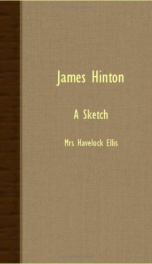Ellis Havelock

Henry Havelock Ellis (2 February 1859 - 8 July 1939) was a British sexologist, physician, and social reformer. Ellis, son of Edward Peppen Ellis and Susannah Mary Wheatley, was born in Croydon, then a small town south of London. His father was a sea captain, his mother the daughter of a sea captain, and many other relatives lived on or near the sea. At seven years of age, his father took him on one of his voyages, during which he called at Sydney, Callao and Antwerp. After his return, Ellis went to a fairly good school, the French and German College near Wimbledon, and afterward attended a school in Mitcham. In April 1875, Ellis left London on his father's ship for Australia, and soon after his arrival in Sydney, he obtained a position as a master at a private school. It was discovered that he had had no training for this position, and so he became a tutor for a family living a few miles from Carcoar. He spent a year there, doing a lot of reading, and then obtained a position as a master at a grammar school in Grafton. The headmaster had died and Ellis carried on the school for that year, but was too young and inexperienced to do so successfully. At the end of the year, he returned to Sydney and, after three months' training, was given charge of two government part-time elementary schools, one at Sparkes Creek and the other at Junction Creek. He lived at the school house on Sparkes Creek for a year, which turned out to be the most eventful year of his life up to that point, as he called it afterwards. In his own words, "In Australia, I gained health of body, I attained peace of soul, my life task was revealed to me, I was able to decide on a professional vocation, I became an artist in literature . . . these five points covered the whole activity of my life in the world. Some of them I should doubtless have reached without the aid of the Australian environment, scarcely all, and most of them I could never have achieved so completely if chance had not cast me into the solitude of the Liverpool Range." Ellis returned to England in April 1879. He had decided to take up the study of sex, and felt his first step must be to qualify as a medical man. He studied at St Thomas's Hospital Medical School, but never had a regular medical practice. His training was aided by a small legacy[1] and also income earned from editing works in Mermaid Series, editions lesser known Elizabethan and Jacobean drama.[1] He joined The Fellowship of the New Life in 1883, meeting other social reformers Edward Carpenter and George Bernard Shaw. In November 1891, at the age of 32, and still a virgin, Ellis married the English writer and proponent of women's rights, Edith Lees (none of his four sisters ever married). From the beginning, their marriage was unconventional; Edith Ellis was openly lesbian, and at the end of the honeymoon, Ellis went back to his bachelor rooms in Paddington, while she lived at Fellowship House. Their 'open marriage' was the central subject in Ellis's autobiography, My Life. According to Ellis in My Life, his friends were much amused at his being considered an expert on sex, what with the fact that he suffered from impotence until the age of 60, when he discovered that he was able to become aroused by the sight of a woman urinating. Ellis named the interest in urination "Undinism" but it is now more commonly called urolagnia. His book Sexual Inversion, the first English medical text book on homosexuality, co-authored with John Addington Symonds, described the sexual relations of homosexual men and boys, something that Ellis did not consider to be a disease, immoral, or a crime. The work assumes that same-sex love transcended age-taboos as well as gender-taboos, as seven of the twenty-one examples are of intergenerational relationships. A bookseller was prosecuted in 1897 for stocking Ellis' book. Although the term homosexual itself is attributed to Ellis, he wrote in 1897, “‘homosexual’ is a barbarously hybrid word, and I claim no responsibility for it,”[2] the hybridity in question being the word's mix of Greek and Latin roots. Other psychologically important concepts developed by Ellis include autoerotism and narcissism, both of which were later taken up by Sigmund Freud. Ellis was a supporter of eugenics. He served as vice-president to the Eugenics Education Society and wrote on the subject a.o. in The Task of Social Hygiene.
do you like this author?
What readers are saying
What do you think? Write your own comment on this book!
write a commentWhat readers are saying
What do you think? Write your own comment on this author!
write a commentBook list

Studies in the Psychology of Sex,Volume 6
Sex in Relation to Society
Series:
Unknown
Year:
Unknown
Raiting:
2.5/5
Show more
add to favoritesadd In favorites

Studies in the Psychology of Sex,Volume 5
Erotic Symbolism; The Mechanism of Detumescence; The Psychic State in Pregnancy
Series:
Unknown
Year:
Unknown
Raiting:
3.5/5
Show more
add to favoritesadd In favorites

Studies in the Psychology of Sex,Volume 4
Sexual Selection In Man
Series:
Unknown
Year:
Unknown
Raiting:
4/5
Show more
add to favoritesadd In favorites
Book list

Studies in the Psychology of Sex,Volume 6
Sex in Relation to Society
Series:
Unknown
Year:
Unknown
Raiting:
2.5/5
Show more
add to favoritesadd In favorites

Studies in the Psychology of Sex,Volume 5
Erotic Symbolism; The Mechanism of Detumescence; The Psychic State in Pregnancy
Series:
Unknown
Year:
Unknown
Raiting:
3.5/5
Show more
add to favoritesadd In favorites

Studies in the Psychology of Sex,Volume 4
Sexual Selection In Man
Series:
Unknown
Year:
Unknown
Raiting:
4/5
Show more
add to favoritesadd In favorites

Studies in the Psychology of Sex,Volume 3
Analysis of the Sexual Impulse; Love and Pain; The Sexual Impulse in Women
Series:
Unknown
Year:
Unknown
Raiting:
4/5
Show more
add to favoritesadd In favorites

Studies in the Psychology of Sex,Volume 2
Sexual Inversion
Series:
Unknown
Year:
Unknown
Raiting:
4.5/5
Show more
add to favoritesadd In favorites

Studies in the Psychology of Sex,Volume 1
The Evolution of Modesty; The Phenomena of Sexual Periodicity; Auto-Erotism
Series:
Unknown
Year:
Unknown
Raiting:
3/5
Show more
add to favoritesadd In favorites

Essays in War-Time
Further Studies in the Task of Social Hygiene
Series:
Unknown
Year:
Unknown
Raiting:
5/5
Show more
add to favoritesadd In favorites

kits woman a cornish idyll
Series:
Unknown
Year:
Unknown
Raiting:
4.5/5
Purchase of this book includes free trial access to www.million-books.com where you can read more than a million books for free. This is an OCR edition with typos. Excerpt from book: CHAPTER III "WHO be there ? Come in, if you please," called Mother Trenoweth, as a knock was heard at the door. " Oh ! be it you, Loveday ? Well, my dear, I'm real glad to see 'ee. Sit 'ee down. It be so mortal dull at times here that I'm right glad to have a neighbour drop in. Sit 'ee down tak' a chair i' front o' the fire." Then, as she caught sight of her neighbour's face, she said quickly, " Why, what's wrong wi' 'ee, woman ?" " What's wrong ? My gosh ! What's right, you might be askin'! Be Janet in ?" Loveday Penberthy peered round the room as she asked the question, and seeing Trenoweth apparently asleep, she smiled and jerked her thumb in an interrogative way over her shoulder towards the door by which she had just entered, at which gesture Mother Trenoweth shook her head, and sighed wearily : " Lordy ! my dear, her bean't back yet." " My blessed life ! " ejaculated Loveday, the gossip and ne'er-do-weel of the village ; " I be near faintin', that I be ; I can 'ardly stan' upright at all"to prove which she leaned her stout person against the end of the window seat, folded her large bare arms, rested them on her capacious stomach, and let all her weight fall on one leg in her endeavour to ease both mind and body. " Whatever be the matter, Loveday ? Is Jan not so well agin ?" " Oh ! Jan ! he be right enough, and if he warn't I don't knaw as I s'ud fret over much 'bout he. Lazy lump ! He don't earn tuppence a week all told, and I've to go down 'long o' Mazes to wash and char and do coddles for he to guzzle hissel' out wi' baccy and meat. I'll have 'ee knaw, Mrs. Trenoweth, that I'm fairly done fur." " Mazes," said the old woman, " Mazes ? who be they then ? But sit 'ee down, Loveday, sit 'ee down, woman, and tell me all 'bout it." "I'm feared I s'll be upsettin' o' K...
Show more
add to favoritesadd In favorites

james hinton a sketch
Series:
Unknown
Year:
Unknown
Raiting:
3.5/5
JAMES HINTON - PREFACE - THE name of James Hinton is unfamiliar to the generation of to-day. Yet he was a man of passionately vivid and eager temperament, whose hands could not fail to leave the distinct impress of that temperament on any subject he touched. At the beginning of his career he wrote a book, Man and his Dwelling Place, which has little interest for us to-day, but made a considerable appeal to the thinkers of Hintons own generation later he wrote a popular yet highly original book of biological character, Life in Nature, which still seems to me the most satisfactory of his books he further accomplished good work in the special field of surgical practice to which he devoted himself, and as an aurist achieved complete professional success finally, during the last years of his life, he became absorbed in social and moral problems, more especially those connected with sex, and accumulated vast piles of manuscript which he never worked up for publication. It so happened that, as a youth, a few years after Hintons death, I chanced to read Lije in Nature, and the view of the natural world there presented, as at once scientifically explicable mechanism and a satisfyingly beautiful vision, greatly aided me in obtaining a harmonious conception of life and the Universe. I cannot say, however, that Hintons moral speculations, which I then knew nothing about, had any influence on my work in the field of sex that work was, indeed, very largely a reaction against premature speculation, an attempt to reach the solid facts by which all mere speculation must be tested and measured. But I became generally interested in Hinton. I obtained access to his unpublished papers, and I assisted Mrs. Hinton in selecting and editing some of them under the title of The Lawbreaker. Finally, it was Mrs. Hintons wish that I should ultimately put a complete presentation of his moral speculations before the world. With that end in view I read and extracted a large quantity of Hintons manuscript and collected the reminiscences of many of his friends. As years passed, however, I realised that the task I had undertaken presented many difficulties, while at the same time I became more occupied with the very different, and even to some extent incongruous, work of my own. Finally, I abandoned my project. Some tell years ago, my wife became interested in Hinton, and spontaneously proposed to take up the task I had abandoned. In this she received the approval and encouragement of Hintons son, the late C. Howard Hinton. I handed over to her the material I had collected and the notes I had made, and she proceeded to investigate Hintons manuscripts afresh and also obtained valuable aid from the more intimate of his few surviving friends. She has at intervals proceeded with this task ever since, hampered not only by some of the same difficulties I encountered, but also by a serious struggle with ill-health. The work has, however, remained entirely her own, and I have had nothing to do with either the planning or the writing of it. The final result, still imperfect as she would herself recognise, is here presented to the reader...
Show more
add to favoritesadd In favorites

autobiography a span classsearchtermspan classsearchtermcollections
Series:
Unknown
Year:
Unknown
Raiting:
2.5/5
Show more
add to favoritesadd In favorites

affirmations
Series:
Unknown
Year:
Unknown
Raiting:
4.5/5
A Collection Of Essays On Nietzsche, Casanova, Zola, Huysmans And St. Francis --This text refers to the Paperback edition.
Show more
add to favoritesadd In favorites
What readers are saying
What do you think? Write your own comment on this author!
write a commentif you like Ellis Havelock try:
readers also enjoyed
What readers are saying
What do you think? Write your own comment on this author!
write a commentGenre
if you like Ellis Havelock try:
readers also enjoyed
Do you want to exchange books? It’s EASY!
Get registered and find other users who want to give their favourite books to good hands!



